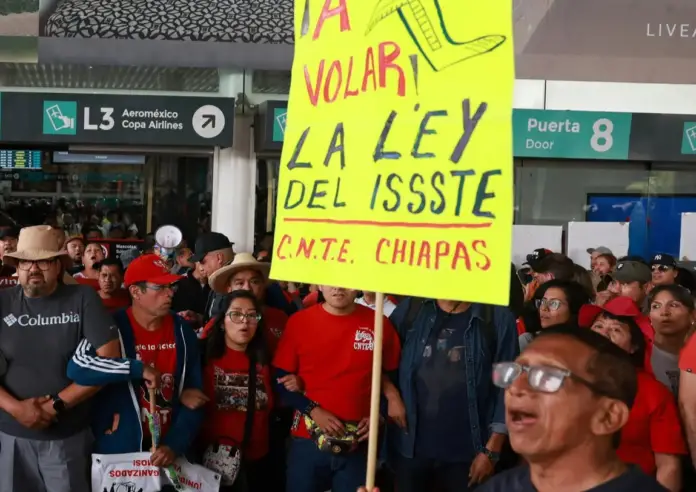A protest organized by a powerful Mexican teachers’ union briefly disrupted flights at the capital’s main international airport on Friday afternoon. The demonstration demanding higher wages sparked chaotic scenes and delayed travel for thousands of passengers, as security forces swarmed the airport terminals in an attempt to impose order.
The strike in Mexico City began around 2:00 p.m. local time and lasted about 20 minutes, as hundreds of union members marched toward the airport entrances. The protest also snarled traffic on streets surrounding the airport, which is located in a densely populated area of the city, and police officers were seen escorting stranded travelers to the airport in vans. Riot police were also seen inside the airport.
The Times A daily selection of stories in Spanish you won’t find anywhere else, with accents and accents. Get it sent to your inbox.
Although the disruption was brief, some international flights departing from Mexico City were canceled or delayed for hours on Friday. Twenty-one airlines operate at the airport, also known as Benito Juárez International Airport, according to its website. On Friday, airlines such as Aeroméxico offered customers the option to reschedule their flights free of charge or by paying only a small difference in price.
The demonstration reflects how Mexico’s leftist president, Claudia Sheinbaum, is under pressure from some unions and social movements, while a weak economy and a massive budget deficit limit her ability to raise wages and improve working conditions for many public employees.
“We have not received that attention or that respect in addressing our demands, not even the most basic ones, from the federal executive branch,” said Eva Hinojosa Tera, a union leader from the state of Michoacán, in a radio interview on Friday.
The organization carrying out the protest, the National Coordinator of Education Workers, commonly known by its acronym CNTE, is a splinter group from Mexico’s largest teachers’ union and has participated in strikes and demonstrations for years. Among the demands of this group of nearly 100,000 members are a doubling of teachers’ salaries and a challenge to pension and education laws they consider harmful.
Earlier this week, the group paralyzed traffic along one of Mexico City’s most iconic avenues, and Mexican journalists reported being attacked by union members protesting in front of the National Palace in the city’s historic center.
Following those chaotic scenes on the streets of Mexico City, Sheinbaum announced Friday morning that she was canceling a scheduled meeting with union representatives. The president said she supported the protests as long as they were “peaceful” and offered the union the opportunity to meet instead with her Secretaries of the Interior and Public Education.
What the government “has given to teachers is a lot, and I wish we could give more because Mexico’s teachers deserve everything,” Sheinbaum said, adding that her government could not afford to double teachers’ salaries. “There are times when there are budget constraints,” she added.
Last week, the Mexican government announced it would raise teachers’ salaries by 10 percent and offer an extra week of vacation. The announcement was welcomed by other teachers’ unions, but not by the more militant CNTE.
In 2023, protesters demanding the return of their money from a defunct financial institution blocked access to Terminal 1 of the airport for several hours.
Mexico’s teachers’ unions have actively organized protests and strikes, for example in 2013 and 2016, when they opposed laws requiring teachers to undergo mandatory evaluations. Some of the protests turned violent at the time.
The current tensions between Sheinbaum and the teachers’ union come at a crucial moment for her administration. Authorities are preparing for the June 1 elections, in which Mexico’s judiciary will be overhauled, shifting to a system in which voters elect thousands of judges across the country, rather than a system in which judges are chosen based on their training, knowledge, and years of experience.
Voter mobilization through unions, which generally support Sheinbaum’s government, could play a decisive role in the election of more than 2,600 judges, from district court judges to Supreme Court justices. But tensions with the protesting teachers’ union could affect voter turnout and the election results, political analysts have warned.

Source: nytimes




